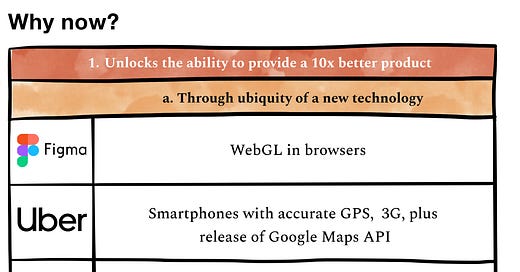This is a 🔓 free preview of this week’s paid post 🔓 If you’d like to read the full post, subscribe here.
Q: I’m raising money for my startup and I keep being asked, Why now? What’s the reason that what I’m building is only possible now? I don’t have a great answer. How important is it to have a “why now”?
Short answer: Having a strong “why now” certainly gives you a better shot at building a large and enduring business (for the reasons I cover below), but it isn’t absolutely essential. Companies like SpaceX, Airbnb, Pinterest, DoorDash, Instacart, Facebook, and Netflix had little if any why now. But these companies all executed like crazy in a large market, and in many cases succeeded because they rode a new trend later in their life (e.g. Netflix and broadband). Bottom line, if there isn’t a great reason why your startup is only possible now, don’t despair—you still have a shot at building a big business, but know that you’ll need to work even harder.
Long answer: With the help of a bunch of smart investors, Twitter, and my own research, I’ve collected why nows for dozens of businesses (see below), and through this research, I’ve come to some unexpected conclusions:
You can build a massive business without an immediate why now
A why now is helpful because it creates two distinct advantages
There are five sources of why now
Your why now can emerge later
You can still absolutely fail with an amazing why now
Huge thank-you to Sarah Tavel, Ann Miura-Ko, Bill Trenchard, Josh Elman, Alexander Taussig, Garry Tan, Eric Vishria, and everyone who shared their insights in this thread for contributing their wisdom to this post 🙏
1. A strong why now creates two distinct advantages
Why do investors look for a why now? Because the odds that you’ll succeed go up. Investors are bet takers, and they would prefer to place bets where they see a higher expected return.
“The importance of the ‘why now’ has a lot to do with the reason venture capital exists. Venture capital works because there is justification for being an unprofitable company at the outset because the opportunity later on is so huge, compounded by the fact that getting in early enables the startup to gain advantage.”
—Ann Miura-Ko, Floodgate Capital
A strong why now—a change in the world—opens up one of two major advantages for your startup:
1. It can unlock the ability to provide a 10x better product
WebGL in browsers: Figma
Adoption of fast broadband in homes: Netflix, Twitch, YouTube
Smartphones with accurate GPS, 3G, and release of Google Maps API: Uber and Lyft
Good enough camera on smartphones: Instagram
Changes in legality of marijuana: Eaze
Release of Gmail APIs: Superhuman
Release of car navigation databases: MapQuest
Advancements in battery technology: Tesla
2. It can create a new untapped market need
Acceleration of fintech: Plaid
Acceleration of e-commerce: Shopify, Etsy, Pinduoduo
Acceleration of the number of online businesses: Stripe, Google, AWS
Acceleration of e-sports: Twitch
Increase in devices per person: Dropbox
COVID-19: Zoom, Peloton, Clubhouse, Hopin, OnlyFans, etc.
“I think of markets like currents, not whether or not they are big bodies of water. The stronger the current, the higher your chance of success. ‘Why now’ is often a description of a current— a macro one. The move to cloud, the employment/cultural trends driving the creator economy, etc. are all tremendous why nows.”
—Sarah Tavel, Benchmark
If you can build a 10x better product, and/or discover a growing untapped market need, you could get away without a strong why now. Which brings us to our second point.
2. You can build a massive business without an immediate why now
Prior to this research, I was sure that you needed to have a strong and immediate why now in order to build a large and enduring business. It was instilled in me through everything I learned about investing and starting a company. It turns out this is not necessarily true. Many successful companies had no strong why now when they got started, and instead succeeded mostly through the sheer will of their founders and great execution:
SpaceX
Airbnb
Pinterest
DoorDash
Facebook
Instacart
GitLab
Cameo
Duolingo
TripActions
Netflix (DVD version)
You could argue that there were macro trends that explain why a DoorDash or an Instacart were only possible in 2013 versus a decade earlier (e.g. increased adoption of smartphones, growing expectation for on-demand services, etc.), but to me, these don’t feel fundamental to their success at that moment in time.
“Of course any startup benefits from the tightest definition of why now—if the company literally couldn’t have existed without the ‘why now.’ Platform, technology, regulatory shifts are all examples of this. Uber would not have been possible without smartphones + GPS. Salesforce wouldn’t have been possible without maturity of web browsers + widespread broadband.
But great companies can also just ride one or more trends to success. The company clearly could’ve existed without these trends but wouldn’t have been nearly as successful.”
—Bill Trenchard, First Round Capital






